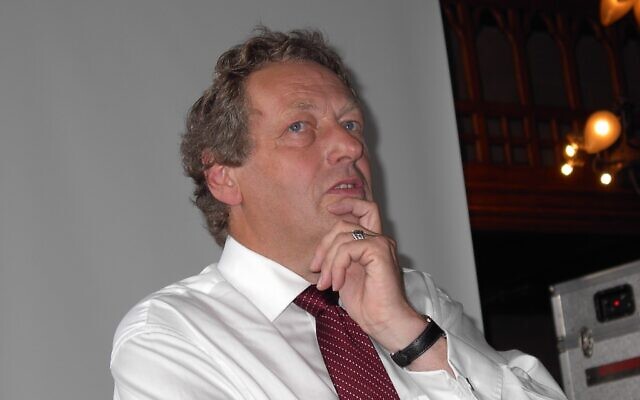BBC dismisses call to ban health expert accused of ‘inflammatory’ Israel tweets
Professor Ashton, formerly the president of the Faculty of Public Health, is regularly interviewed by broadcasters and media outlets

The BBC has dismissed calls from Conservative Friends of Israel (CFI) to ban a leading public health expert from its programming.
Professor John Ashton, who recently appeared in an episode of Panorama to discuss the UK’s response to the coronavirus pandemic, has been accused of publishing inflammatory material about Zionism on social media.
The parliamentary group urged the broadcaster last month to remove Professor Ashton from its list of contributors and make a public statement.
Last month, a report in the Jewish Chronicle alleged the professor had made “inflammatory” comments online and compared Zionism to Nazism in material posted on social media between 2012 and 2018. According to the newspaper, one tweet posted in 2014 suggested it was “time for Jews to reflect” on the situation in Gaza.
Professor Ashton, who declined to comment when approached by Jewish News this week, has denied accusations of antisemitism. He is regularly interviewed by broadcasters and media outlets, including Channel 4.
In a letter to Conservative Friends of Israel, released by the parliamentary group on Wednesday, Francesca Unsworth, director of BBC News and Current Affairs, appeared to defend the broadcaster’s decision to include him in BBC programming.
She wrote: “I understand that Professor Ashton was eminently well qualified to speak about this subject [the Covid-19 pandemic]. He has held positions at various universities, and was regional director of Public Health for Cumbria. More recently, he was president of the Faculty of Public Health.
“Professor Ashton did not, of course, make any comments of the kind that you describe in this programme and I hope you understand that I would have grave doubts about the impact on freedom of speech, and the BBC’s ability to report freely and impartially, if we were to ban contributors from speaking on the subject of their acknowledged expertise because of the political views they have expressed, however abhorrent some members of the audience may find them. More broadly, we do not ban any contributors from our output as you would wish.”
In response to the BBC, Preseli Pembrokeshire MP Stephen Crabb and Lord Eric Pickles, both parliamentary chairmen of CFI, and Lord Stuart Polak, a CFI honorary president, criticised the letter in a statement on Wednesday.
They said: “We are disappointed with the BBC’s response, which shows a lack of self-awareness. BBC news coverage has rightly sought to hold organisations accountable for their use of individuals who are in breach of the IHRA [International Holocaust Remembrance Alliance] modern definition of Antisemitism.
“It smacks of double standards that they do not see the relevance of applying the same discipline to themselves. The BBC always have a choice of experts, all we ask is that they choose a participant that does not send an ambiguous message”.
A spokesperson for the BBC declined to comment.

Thank you for helping to make Jewish News the leading source of news and opinion for the UK Jewish community. Today we're asking for your invaluable help to continue putting our community first in everything we do.
For as little as £5 a month you can help sustain the vital work we do in celebrating and standing up for Jewish life in Britain.
Jewish News holds our community together and keeps us connected. Like a synagogue, it’s where people turn to feel part of something bigger. It also proudly shows the rest of Britain the vibrancy and rich culture of modern Jewish life.
You can make a quick and easy one-off or monthly contribution of £5, £10, £20 or any other sum you’re comfortable with.
100% of your donation will help us continue celebrating our community, in all its dynamic diversity...
Engaging
Being a community platform means so much more than producing a newspaper and website. One of our proudest roles is media partnering with our invaluable charities to amplify the outstanding work they do to help us all.
Celebrating
There’s no shortage of oys in the world but Jewish News takes every opportunity to celebrate the joys too, through projects like Night of Heroes, 40 Under 40 and other compelling countdowns that make the community kvell with pride.
Pioneering
In the first collaboration between media outlets from different faiths, Jewish News worked with British Muslim TV and Church Times to produce a list of young activists leading the way on interfaith understanding.
Campaigning
Royal Mail issued a stamp honouring Holocaust hero Sir Nicholas Winton after a Jewish News campaign attracted more than 100,000 backers. Jewish Newsalso produces special editions of the paper highlighting pressing issues including mental health and Holocaust remembrance.
Easy access
In an age when news is readily accessible, Jewish News provides high-quality content free online and offline, removing any financial barriers to connecting people.
Voice of our community to wider society
The Jewish News team regularly appears on TV, radio and on the pages of the national press to comment on stories about the Jewish community. Easy access to the paper on the streets of London also means Jewish News provides an invaluable window into the community for the country at large.
We hope you agree all this is worth preserving.





















